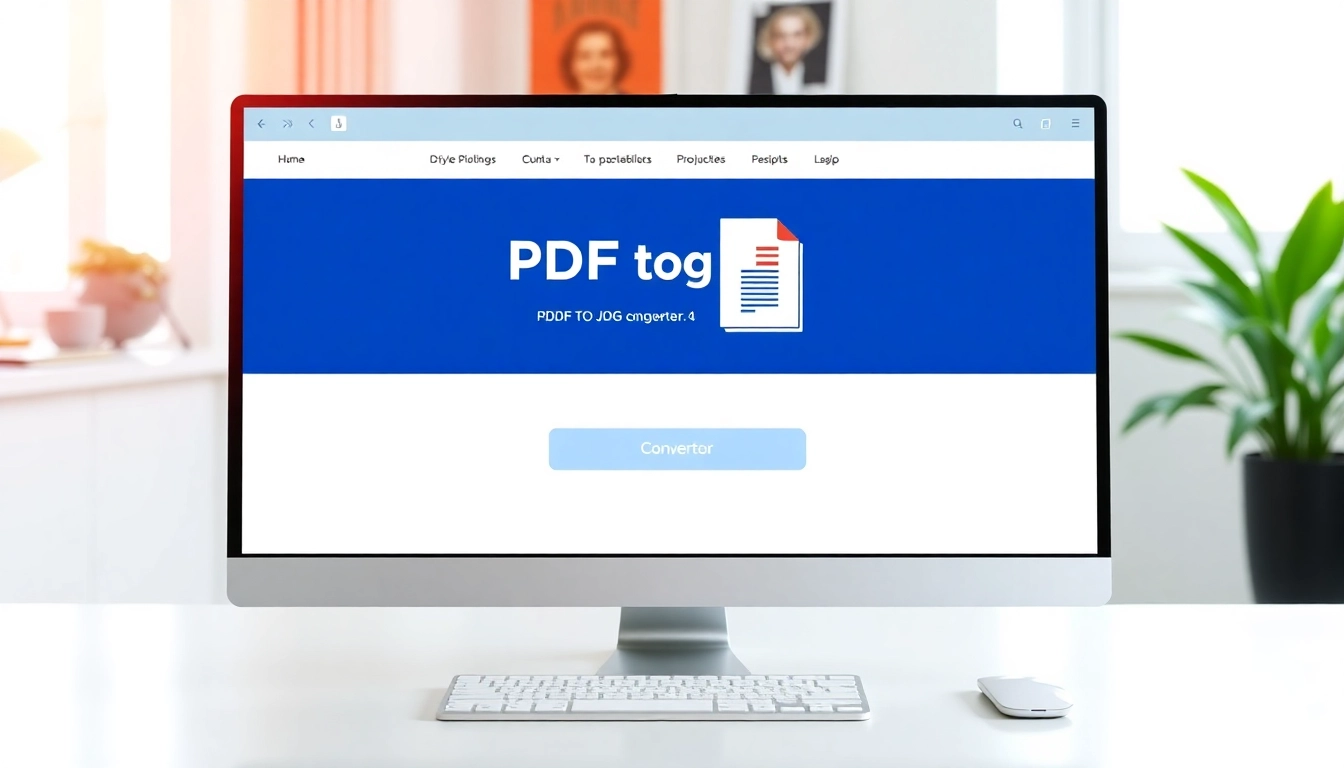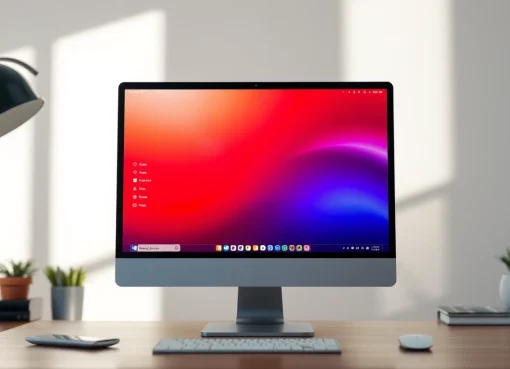Convert PDF to JPG Quickly and Easily with Our Reliable Tool

Understanding the PDF to JPG Conversion Process
In today’s digital landscape, the ability to interact with documents is paramount. PDF (Portable Document Format) and JPG (Joint Photographic Experts Group) are two prevalent file formats used for different purposes. While PDFs are typically used for viewing, printing, and sharing documents without altering the formatting, JPG images are ideal for displaying graphics and photos. This article explores the intricacies of converting PDF to JPG, a process important for many individuals and professionals alike. You can easily perform this conversion using a dedicated pdf to jpg converter.
What is PDF and JPG Format?
The PDF format was developed by Adobe in 1993, primarily aimed at creating a format that could encapsulate documents in a manner independent of the application software, hardware, and operating systems used to create them. PDFs support a variety of content types, including text, images, and vector graphics, making them versatile for everything from manuals to forms.
On the other hand, JPG is a widely used method of lossy compression for digital images, particularly for photographs and web graphics. This format strikes a balance between manageable file sizes and high-quality visuals, making it indispensable in web design and social media.
Why Convert PDF to JPG?
There are several reasons to convert a PDF file into JPG format. Notable motivations include:
- Image Sharing: JPG is a widely accepted format for sharing images on social media or embedding in web pages.
- Editing Flexibility: JPG files are easier to edit with various graphic design tools, enabling users to manipulate images directly.
- Space Efficiency: Converting multiple PDF pages into JPG format can reduce storage needs, especially for image-heavy documents.
- Visual Presentation: JPG images often provide a clearer presentation of visual content, such as images or graphs within a PDF document.
Common Use Cases for PDF to JPG Conversion
There are numerous situations where converting a PDF to JPG becomes necessary:
- Digital Portfolios: Artists, photographers, or designers may convert their PDF portfolios to JPG to easily share their work online.
- Educational Materials: Educators may convert PDF documents with images or diagrams into JPGs for more accessible online resources.
- Social Media: Marketers might convert promotional PDFs into JPGs for visually appealing posts on platforms like Instagram or Facebook.
- Presentations: Converting PDF presentations to JPG allows for easy integration into slide shows without requiring PDF reader software.
How to Use Our PDF to JPG Converter
Step-by-Step Conversion Guide
Using our PDF to JPG converter is simple. Below are detailed steps to facilitate the conversion process:
- Access the Converter: Navigate to our PDF to JPG converter’s webpage.
- Upload Your File: Click on the upload button or drag and drop your PDF file into the designated area.
- Select Conversion Preferences: Choose whether to convert individual pages or extract images directly from the PDF.
- Initiate Conversion: Click on the ‘Convert’ button and await the completion message.
- Download Your JPG: Once the conversion is complete, download your high-quality JPG files directly to your device.
Best Practices for Uploading PDF Files
For optimal results during the conversion process, keep the following best practices in mind:
- Check File Size: Ensure the PDF file is within the upload size limits of the converter.
- Avoid Password-Protected PDFs: Most converters cannot process encrypted files. Remove password protection if necessary.
- Maintain Image Quality: Use PDFs with high-resolution images for better output quality.
- Organize Your Documents: Ensure that the document being converted is well-formatted and legible.
Tips for Optimal JPG Output Quality
To enhance the quality of your converted JPG images, consider the following:
- Choose the Right DPI: If given the option, select a higher dots per inch (DPI) setting for better clarity.
- Control Compression Settings: Some converters allow you to modify compression levels. Opt for lower compression for better quality.
- Preview Before Saving: Always preview the converted JPG files to ensure that all details are clearly represented.
Comparing Online PDF to JPG Converters
Features to Look For in a Converter
When searching for a reliable online PDF to JPG converter, consider the following key features:
- User Interface: A simple and intuitive interface is essential for a smooth conversion experience.
- Output Quality: Ensure the converter provides high-quality JPG outputs without significant loss of fidelity.
- Speed: Look for converters that promise quick processing and minimal waiting time.
- Security: Choose converters that respect user privacy and do not retain uploaded files after conversion.
- Batch Conversion: Many users need to convert multiple files at once; ensure this feature is available if needed.
Our Tool vs. Competitor Options
While there are numerous PDF to JPG converters available online, our tool stands out due to the following reasons:
- User-Friendliness: Our interface is designed for users of all skill levels, making the conversion process straightforward.
- High-Quality Output: We ensure that converted images maintain clarity, with minimal compression loss.
- Quick Execution: Our converters typically complete conversions in seconds, streamlining the entire process.
- Enhanced Security: We prioritize user privacy by automatically deleting uploaded files after conversion.
User Feedback and Reviews
User feedback is a critical aspect of choosing a converter. Our users consistently appreciate:
- Speed and Efficiency: Many users note that our tool is one of the fastest available.
- Quality Retainment: Users are often surprised by how well the images reproduce detail compared to the original PDFs.
- Ease of Use: Thanks to our streamlined navigation, users frequently comment on how accessible our tool is for routine tasks.
Advanced Features of Our PDF to JPG Converter
Batch Conversion Capabilities
For professionals or users dealing with large volumes of files, batch conversion is a vital feature. Our converter allows users to upload multiple PDF files simultaneously and convert them to JPGs in one streamlined process, saving time and effort.
Customization Options for JPG Output
Users can customize their JPG outputs according to their needs. Options may include:
- Image Size: Users can select the dimensions for their JPG images.
- Quality Settings: Adjust settings for higher fidelity or smaller file sizes, depending on what is required.
- Format Selection: Choose different image formats—JPG, PNG, and others—if supported.
Security Measures During Conversion
Data security is paramount when uploading documents online. Our PDF to JPG converter employs strong encryption protocols to ensure user files are secure. We comply with international data protection regulations and automatically purge files after conversion to safeguard your privacy.
Troubleshooting Common Conversion Issues
File Size Limitations and Solutions
File size limitations can be a common hurdle in the conversion process. If you encounter issues, here are some solutions:
- File Compression: Consider compressing the PDF file before conversion using PDF compression tools.
- Splitting PDF Documents: Divide larger PDFs into smaller sections and convert them separately.
- Review Converter Limitations: Be aware of the file size limits imposed by the converter you are using and choose accordingly.
What to Do If Conversion Fails?
Conversion failure can be frustrating. Here are steps to troubleshoot:
- Check File Integrity: Ensure the PDF file is not corrupted or damaged.
- Try Another Browser: Sometimes, compatibility issues with web browsers can disrupt the conversion. Switch to a different browser if needed.
- Re-upload the Document: Remove and re-upload the file, as this can reset server permissions and solve minor issues.
- Contact Support: If persistent issues occur, reach out to the converter’s support team for assistance.
FAQs About PDF to JPG Conversion
Here are some frequently asked questions regarding the PDF to JPG conversion process:
- Is the conversion process reversible? No, once converted to JPG, the file cannot be turned back into its original PDF format without additional software.
- Can I convert password-protected PDFs? Most converters do not support encrypted files without the password. Remove security settings if possible.
- Will the quality of images degrade when converting? If using a quality converter, output quality should be high. However, always check settings for compression options.



Leave a Comment